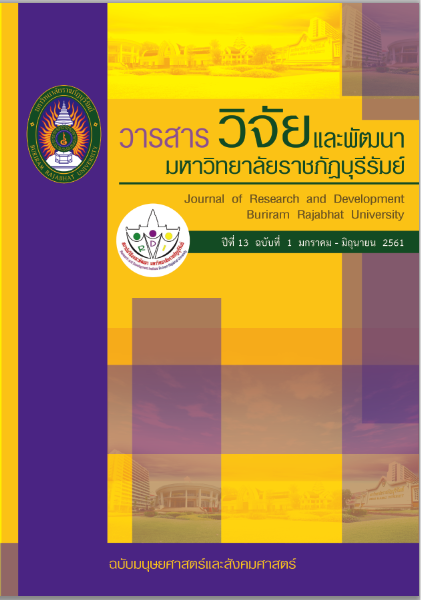Relationship between Knowledge Management of Internal Audit and the Effectiveness of Internal Audit of Internal Auditors of Higher Education Institutions in Thailand
Main Article Content
Abstract
The researcher conducted the relationship between knowledge management of internal audit and the effectiveness of internal audit of internal auditors of Higher Education Institutions in Thailand by collecting data from 90 internal auditors of Internal Auditors of Higher Education Institutions in Thailand. By useding questionnaires as an instrument. The statistics used for analyzing the collected data were t-test, F-test (ANOVA and MANOVA), a correlation analysis, a simple regression analysis, and a multiple regression analysis.
The results showed that the internal auditors of Higher Education Institutions with having knowledge management of internal audit as a whole and in each of these aspects were at a high level, and the internal auditors of Higher Education Institutions with having the effectiveness of internal audit as a whole and in each of these aspects were at a high level. The internal auditors of Higher Education Institutions with different type of a educational levels, had different opinions on the knowledge management with having knowledge management of internal audit as a whole and in the aspects of data collecting and preparing information system. The internal auditors of Higher Education Institutions with different type of a educational levels, had different opinions on the effectiveness of internal audits management with having knowledge management of internal audit in the aspects of risk assessment and early warning. According to the analyses of relationships and the impacts, it showed that : 1) the knowledge management of internal audit in the aspect of brainstorming had positive relationships and impacts on the effectiveness of internal audit as a whole and in the aspects of the operation of internal audits, the operation and the follow up, the promotion of good governance, risk assessment and early warning, and giving knowledge, advice and counseling, and 2) the knowledge management of internal audits in the aspect of the preparation of information system had positive relationship and impact on the effectiveness of internal audit in the aspect of overall operation of internal audits.
Article Details
เนื่อหาและข้อมูลในบทความ เป็นความรับผิดชอบของผุ้แต่ง
บทความในวารสารเป็นลิขสิทธิ์ของวารสารวิจัยและพัฒนา มหาวิทยาลัยราชภัฏบุรีรัมย์
References
ระบบการตรวจสอบภายในของกระทรวงศึกษาธิการ ประจำปีงบประมาณ พ.ศ. 2554. กรุงเทพฯ : กระทรวงศึกษาธิการ.
2. บุญชม ศรีสะอาด. (2553). การวิจัยเบื้องต้น. (7). กรุงเทพฯ : สุวิริยาสาส์น.
3. สมนึก เอื้อจิระพงษ์พันธ์. (2553). การจัดการความรู้กับนวัตกรรม. กรุงเทพฯ : ห้างหุ้นส่วนจำกัด สามลดา.
4. อุษณา ภัทรมนตรี. (2545). การตรวจสอบและการควบคุมภายในแนวคิดและกรณีศึกษา. กรุงเทพฯ :
มหาวิทยาลัยเกษตรศาสตร์.
5. อุษณา ภัทรมนตรี. (2546). การตรวจสอบและการควบคุมภายในแนวคิดและกรณีศึกษา. กรุงเทพฯ :
มหาวิทยาลัยเกษตรศาสตร์.
6. อุษณา ภัทรมนตรี. (2552). การตรวจสอบและการควบคุมภายในแนวคิดและกรณีศึกษา. กรุงเทพฯ :
จามจุรีโปรดักส์.
7. กรรณิการ์ ตะภา. (2559). ผลกระทบของทักษะการตรวจสอบภายในเชิงกลยุทธ์ที่มีต่อคุณภาพรายงานการตรวจสอบภายในของเจ้าหน้าที่ตรวจสอบภายในขององค์กรปกครองส่วนท้องถิ่นในประเทศไทย. วิทยานิพนธ์ บช.ม. (การบัญชี), มหาวิทยาลัยมหาสารคาม.
8. ชาญณุกร เพ็ญศิริ. (2548). ปัจจัยที่มีผลกระทบต่อความมีประสิทธิผลของการตรวจสอบภายในในมุมมองของคณะกรรมการตรวจสอบของบริษัทจดทะเบียนในตลาดหลักทรัพย์แห่งประเทศไทย. วิทยานิพนธ์ บช.ม. (การบัญชี), จุฬาลงกรณ์มหาวิทยาลัย.
9.พรเพ็ญ องอาจวาจา. (2549). ความต้องการพัฒนางานตรวจสอบจากปัญหาที่พบในการปฏิบัติงาน
ตรวจสอบภายในและตรวจสอบการดำเนินงานของผู้ตรวจสอบภายใน. วิทยานิพนธ์ บช.ม.
(การบัญชี), มหาวิทยาลัยบูรพา.
10. วิชิต แก่นกำจร. (2551). ระบบการจัดการความรู้สำหรับงานตรวจสอบภายในของสำนักงานตรวจสอบภายในอัยการสูงสุด. วิทยานิพธ์ วท.ม. (วิทยาศาสตร์), มหาวิทยาลัยเชียงใหม่.
11. วิญญารักษ์ ทิพพิชัย. (2554). ผลกระทบของกลยุทธ์การตรวจสอบภายในที่มีต่อคุณภาพรายงาน การบ
ตรวจสอบของผู้ตรวจสอบภายใน สังกัดกระทรวงมหาดไทย. วิทยานิพนธ์ บช.ม. (การบัญชี), มหาวิทยาลัยมหาสารคาม.
12. สวรัตน์ สวธนไพบูลย์. (2554). ความพึงพอใจต่อสภาพแวดล้อมในการทำงานกับความผูกพันกับองค์กรของพนักงานระดับปฏิบัติการ. วิทยานิพนธ์ ศศ.ม. (ศิลปะศาสตร์), มหาวิทยาลัยพระจอมเกล้า
พระนครเหนือ.
13. อัจฉรารัตน์ สิทธิ. (2553). ทัศนคติของปัจจัยที่มีผลต่อประสิทธิผลและประสิทธิผลของการตรวจสอบภายในมุมมองของผู้รับการตรวจ ของบริษัทจดทะเบียนในตลาดหลักทรัพย์แห่งประเทศไทย.
วิทยานิพธ์ บช.ม. (การบัญชี), มหาวิทยาลัยธรรมศาสตร์.
14. อุทัยรัตน์ กู่แก้ว. (2554). ผลกระทบของสภาพแวดล้อมในการทำงานที่มีต่อคุณภาพการตรวจสอบภายในของผู้ตรวจสอบภายในของสถาบันอุดมศึกษาของรัฐ. วิทยานิพธ์ บช.ม. (การบัญชี), มหาวิทยาลัยมหาสารคาม.
15. Beckmerhagen, H.P. Berg, S.V. Karapetrovic and W.O. Willborn. (2004). On the effectiveness of quality management system audits. The TQM Magazine.
16. สมาคมผู้ตรวจสอบภายในแห่งประเทศไทย. (2558). ผู้ตรวจสอบภายในที่ดีควรมีคุณสมบัติอย่างไร.
[ออนไลน์]. เข้าถึงได้จาก : https://www.theiiat.or.th. (วันที่ค้นข้อมูล : 2 ตุลาคม 2558).
17. สำนักงานคณะกรรมการการอุดมศึกษา. (2553). ประวัติและความเป็นมาของสำนักคณะกรรมการการ
อุดมศึกษา. [ออนไลน์]. เข้าถึงได้จาก : https://www.mua.go.th. (วันที่ค้นข้อมูล : 2 กรกฎาคม 2557).


